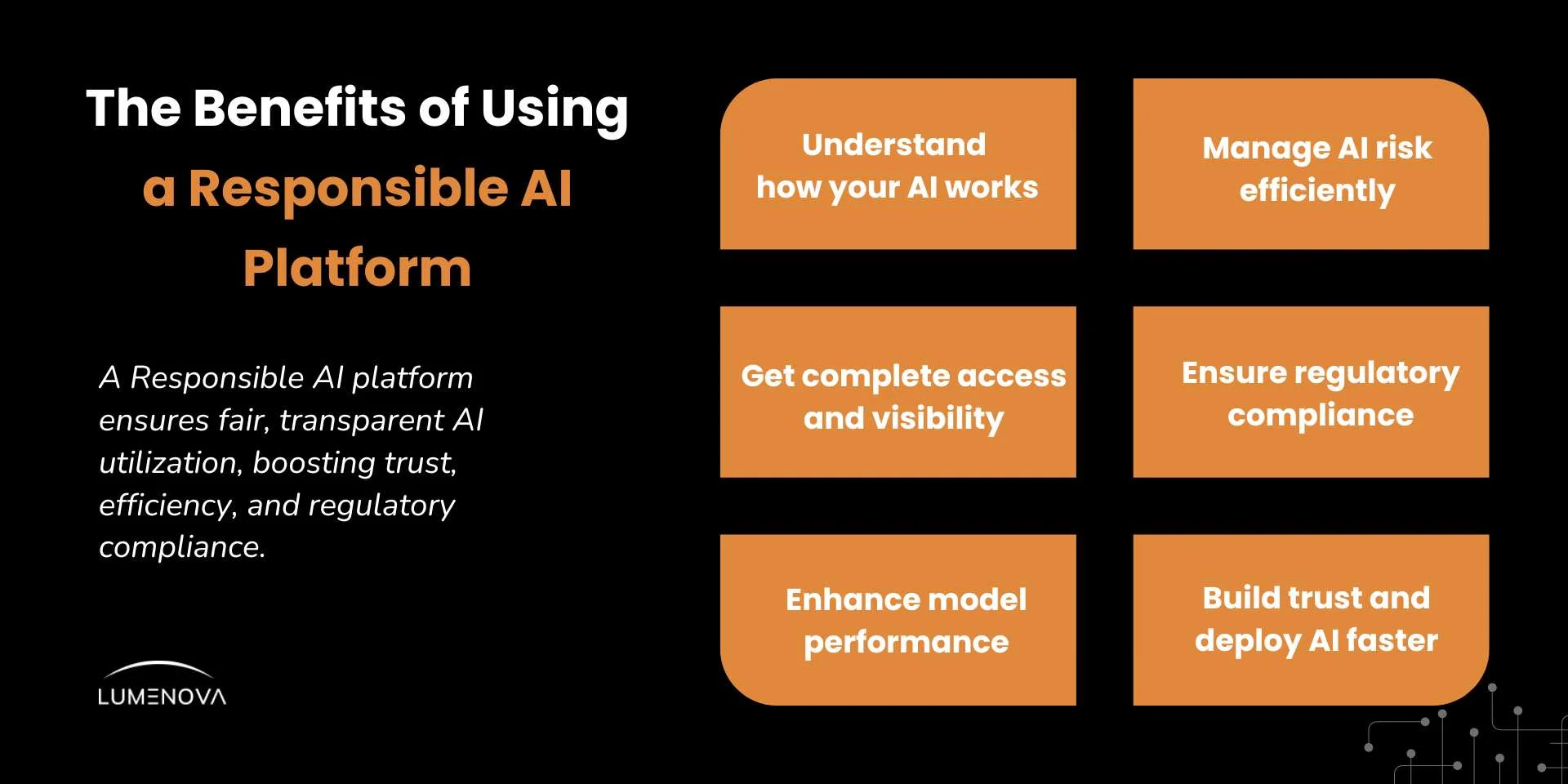
Contents
In the ever-evolving landscape of technology, navigating the complexities of AI deployment has become a critical challenge for organizations seeking to harness the power of artificial intelligence. The adoption of AI involves intricate considerations spanning ethical, regulatory, and technical dimensions.
An effective, purpose-built platform to help ensure Responsible AI development and usage can assist your organization in simplifying the intricate layers inherent in such projects.
Where Does AI Hold the Greatest Significance?
Early adopters of AI span various sectors, with notable emphasis in banking/finance, insurance, healthcare, and heavily regulated industries like telecom, as well as consumer-centric fields such as retail and hospitality/travel.
A sector-specific breakdown reveals the following applications:
Banking and Investments: AI systems could adjust credit scoring to assess creditworthiness, extending financial opportunities to underserved communities, while automating administrative tasks, streamlining workflows, and optimizing operational performance. AI could automate various tasks, such as document processing and verification, improving efficiency and reducing human error.
Insurance: When it comes to the insurance sector, an AI platform could offer automation, claims processing and fraud detection, AI-Enhanced Interactive support (chatbots that provide 24/7 customer support), predictive maintenance for property insurance, and risk mitigation.
Healthcare and Life Sciences: Using an AI platform to store medical data could help in disease diagnosis, health outcome prediction, and the creation of personalized treatment plans such as X-rays, MRIs, and CT scans to assist in diagnosis and treatment planning, with more emphasis placed on the automation of administrative and operational tasks.
HR and Recruitment: Leveraging AI to mitigate bias in the hiring process promotes diversity and inclusion by ensuring fair evaluation of candidates from diverse backgrounds. AI can also be used to assess skill gaps within the workforce, recommend training programs, forecast future workforce needs, identify high-potential employees, and develop succession plans for key roles.
Telecommunications: Implementing AI-powered voice recognition technology for voice-activated services, virtual assistants, and speech-to-text transcription and utilizing AI algorithms to analyze market demand, predict traffic growth could optimize network planning and expansion strategies. Applying AI models to analyze customer usage patterns, demographics, and interaction history could help to identify at-risk customers and implement targeted retention initiatives.
Utilities: Using AI algorithms could help predict equipment failures, optimize maintenance schedules, and prevent costly downtime in utility infrastructure. Leveraging AI to optimize energy distribution, balance supply and demand could improve grid efficiency. Applying AI models to forecast renewable energy production from sources like solar and wind, could enable better integration into the grid.
The Benefits of Using a Responsible AI Platform
Using a Responsible AI (RAI) platform offers numerous advantages by embedding ethical considerations into the core of technological advancement. And just because your AI system is compliant at a given moment, it doesn’t mean there aren’t any risks. When it comes to compliance and safety, none should take a back seat, as systems evolve and proliferate at a rate that surpasses regulators’ abilities to craft new legislation or make changes in time.
Having a broader landscape of approved regulations, especially now that the EU AI Act has passed, it’s going to future proof AI compliance strategies and we will better understand the appropriate risk mitigation methods in the context of evolving AI technology.

The Key to Understanding AI
The heart of most RAI platforms is AI explainability (XAI). If you want to ensure your AI systems are fair, ethical, and meet compliance standards, grasping how they reach decisions is crucial. RAI is the tool that provides this insight, revealing the inner workings of your AI models.
Gain Deep Insights into Your Model
A solid RAI platform does more than just shed light on AI processes. It should offer comprehensive analytics to give you a full-circle view of your model’s performance, testing everything from AI fairness and security, to how well and reliably it works, right down to verifying the quality of the data it uses.
Boosting Your Model’s Efficiency
Improving your AI doesn’t just stop at understanding it. Once you’ve delved into your model, you can start fine-tuning, as early as possible in its life cycle. This means fixing biases, honing accuracy, and cutting down errors. This optimization process not only improves the model but can also result in better efficiency and save costs.
Tackle AI Risks Head-On
If you consider an RAI platform more like an AI risk navigator, it can help you to identify and manage potential issues. It does so by offering tools to evaluate and measure risks, enabling you to make informed decisions on how to address these problems. This is a boon for Risk & Compliance teams, simplifying their tasks.
Meet Ethical and Legal Standards
When it comes to ethics and regulations, an RAI platform serves as a guide. Its ability to assist here is contingent on whether it’s properly equipped with the latest legal and policy frameworks and can update as these standards evolve.
Trust-Building and Rapid AI Deployment
Using RAI implies more than just about being responsible; it’s about building trust with everyone affected by your AI systems. So, by showcasing your commitment to ethical practices, you gain the confidence of customers and stakeholders, which can lead to a much quicker AI adoption and enhanced reputation.
Now, by adopting a purpose-built RAI platform, you’re not just committing to ethical AI; you’re streamlining your journey to AI maturity and fostering a trusted environment that can drive quicker adoption and market competitiveness.
In essence, it fosters an inclusive, trustworthy, and sustainable relationship between humans and machines, increasing user confidence and potentially boosting broader AI adoption.
What Can the Lumenova AI Platform Achieve for Your Business
At Lumenova AI, our goal as a platform is to mitigate potential risks and negative impacts associated with AI technologies, while maximizing their positive contributions. We offer comprehensive assessments for informed decision-making to:
- Automate the complete responsible AI lifecycle to meet business objectives faster, while ensuring a seamless collaboration among stakeholders.
- Assess risks in AI models during pre-deployment, avoiding reputational risks.
- Centralize model and data access management among divisions with granular permissions tools.
- Facilitate regulatory assurance through automated documentation fulfilled transparency.
- Preserve privacy while enabling full transparency for output watermarking and data lineage tracking.
- Continuously monitor emerging issues from models in production.
- Initiate specialized reviews of uncertain responses or impact assessments of unintended harms along with mitigation strategies.
Lead Your Organization to Responsible AI with Lumenova AI
In the domain of artificial intelligence, tackling obstacles like bias and related risks presents formidable challenges. Our platform provides a holistic strategy to tackle these issues with precision. We undertake comprehensive assessments and employ resilient strategies to handle AI risks spanning data, algorithms, and predictions, all while giving paramount importance to transparency throughout the process.
Crafted to elevate the fairness, transparency, and responsibility of your AI systems, our platform ensures adherence to ethical standards and the promotion of fairness in decision-making processes. We put a strong emphasis on mitigating bias and advancing transparency, which means our RAI platform can empower your organization to cultivate an inclusive and responsible AI environment.
Discover how Lumenova AI’s Responsible AI platform can help your organization navigate the complexities of AI deployment by requesting a demo or contact our AI experts for more details.
Frequently Asked Questions
A Responsible AI platform ensures ethical, transparent, and compliant AI deployment, helping organizations mitigate risks, improve trust, and align with evolving regulations while maintaining operational efficiency.
Sectors like finance, healthcare, insurance, telecommunications, and utilities benefit the most, as they rely on AI for decision-making, risk assessment, automation, and regulatory compliance in highly regulated environments. Ultimately, however, all industries could benefit from Responsible AI platforms.
By offering AI explainability, risk assessment tools, and compliance monitoring, a Responsible AI platform helps organizations understand how AI models make decisions while ensuring fairness, reliability, transparency, and accountability.
It provides actionable and easy-to-understand insights into model performance, identifies biases, detects risks, and allows for continuous monitoring, enabling businesses to optimize AI systems for accuracy, efficiency, reliability, fairness, privacy, and security.
Lumenova AI automates AI governance, facilitates risk assessments, ensures regulatory compliance, enhances transparency, and enables organizations to deploy AI responsibly while building trust with stakeholders.